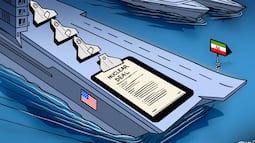More cartoons
-
Shadi's take on efforts to secure the US-Iran talks
February 06, 2026 -
Shadi's take on the US-Iran talks
February 04, 2026 -
Shadi's take on the World Governments Summit in Dubai
February 03, 2026 -
Shadi's take on the further drop in the UAE gold prices
February 02, 2026 -
Shadi's take on the issue of Hezbollah disarmament in Lebanon
February 01, 2026 -
Shadi's take on tensions between the US and Iran
January 29, 2026 -
Shadi's take on Middle East flight disruption
January 28, 2026
Get news alerts from

You can manage notifications at any time by clicking the notifications icon.








